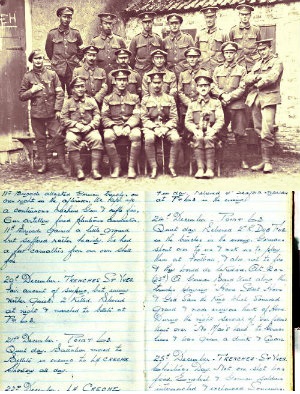How life was while in the front line as well as the events of the Christmas Truce in December 1914 were revealed in the handwritten diaries of the WWI Regimental Sergeant-Major George Beck.
The war memoirs of Regimental Sergeant-Major George Beck has recently been revealed a century after the good soldier wrote them.
The diaries of RSM George Beck were handwritten and described in detail the excruciating life soldiers in the front lines of the Great war had to contend with. Moreover, his accounts also disclosed the grim realities in the Battle of the Somme as well as the employment of poison gas throughout the First World War as he served with the 1st Warwickshire Regiment on the Western Front.
But not all the writings of RSM George Beck were in a sullen note. The war hero also described the events of the Christmas Truce in 1914. He vividly described how the Tommies played football with their sworn enemies. Not only that. The soldiers from both the warring sides, even shared cigars with each other. Additionally, the German band went on to play God Save the King right on Christmas Eve which made the Tommies homesick.
On one entry about how Germans intermingled with the British soldiers, RSM George Beck wrote about how there were no shots fired and how the soldiers from both opposite sides of the war went on to exchange souvenirs with each other. He even specified that the Germans wanted the British troops’ bully beef and jam as they were willing to exchange almost anything for these items.
There were other lighter moments his diary entries recorded. One such was about how a snowball fight ensued with the French even in the heat of combat.
Know RSM George Beck
Regimental Sergeant-Major George Beck was born in 1881 in Warwickshire. By 1898, he joined the army and was shipped off to South Africa during the Boer War.
He rose up in the ranks and, by 1905, was already a color sergeant. This level in the army allowed him to marry. And so, he went on to marry Eliza Attwooll, who came from Portland, Dorset, and settled on the island. They went on to have six children together.
For his service during the Great War, RSM George Beck was awarded the Military Cross and the Distinguished Conduct Medal. A commission for an officer position came with the distinctions he got but he turned it down.
He went on to work at the Duke of Yorkshire School in Dover, Kent, but was discharged almost four years later due to failing health.
After his stint in Dover, WWI hero George Beck worked as a Portland Bus Company conductor until his death on the 20th of March, 1928. The cause of his death was pneumonia-influenza. He was only 47 years old when he passed away.
At his funeral, George Beck received full military honors. His diaries had been passed on in his family for generations until his granddaughter, Caroline Milverson, turned them over to the Dorset History Center.

As Mrs. Milverson states, she is delighted that others will have access to her grandfather’s personal thoughts and feelings throughout the Great War, as he wrote them a century ago.
The diaries of George Beck have also been transcribed for several months by a volunteer in the history center, Alison Schwalm. According to her, it had been a privilege to transcribe the diaries of a non-commissioned officer who clearly cared for his comrades as well as the young family he had left back home. She even added that the entries of George Beck in the front lines of the Great War and his intermittent leave to to Portland bore stark contrast with each other.
The diaries of WWI hero George Beck can now be seen online. His entries, a voice from 100 years ago, started to go live last August 21. each account is shown on the specific date as George beck wrote them in the front lines.
